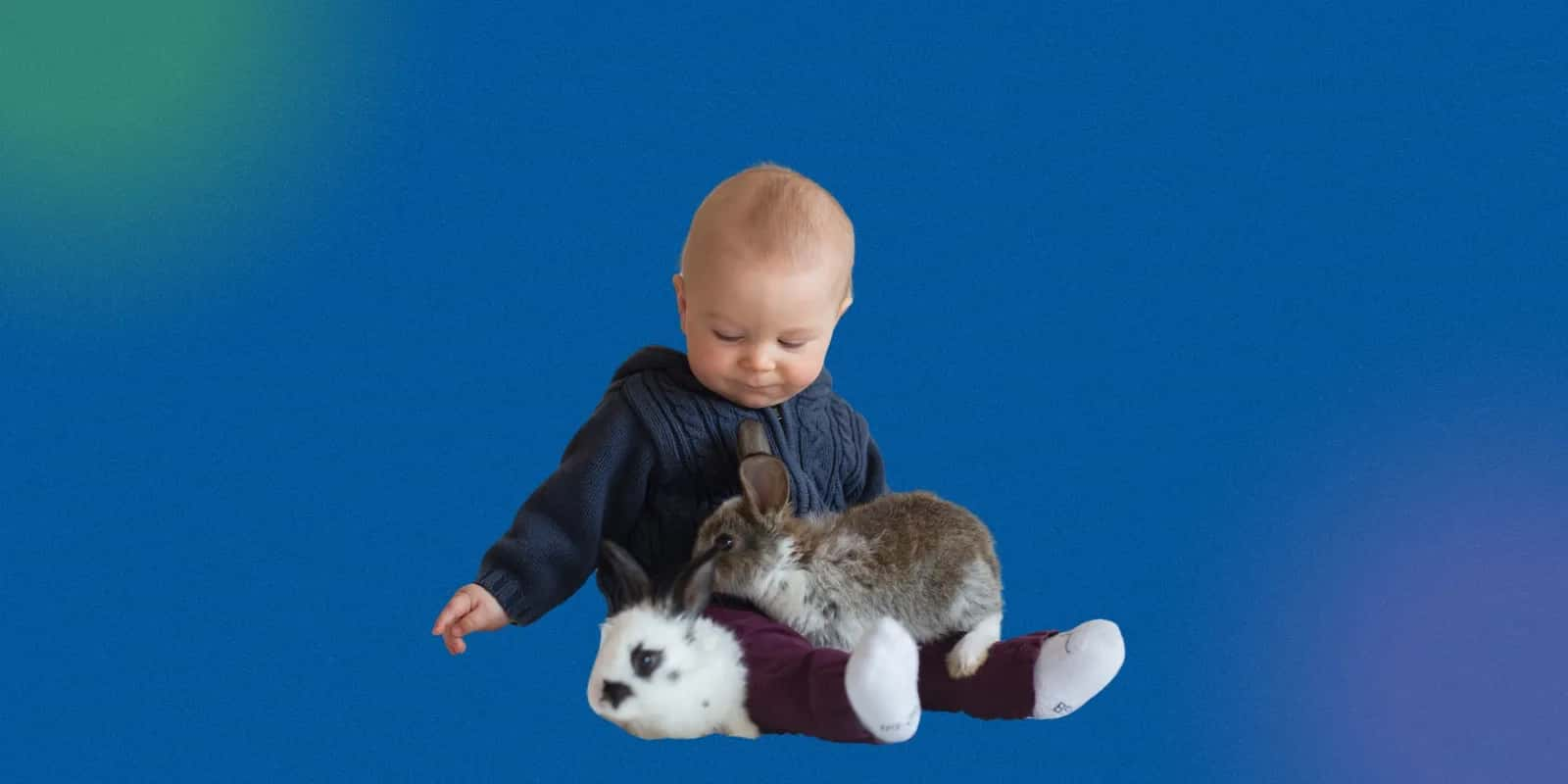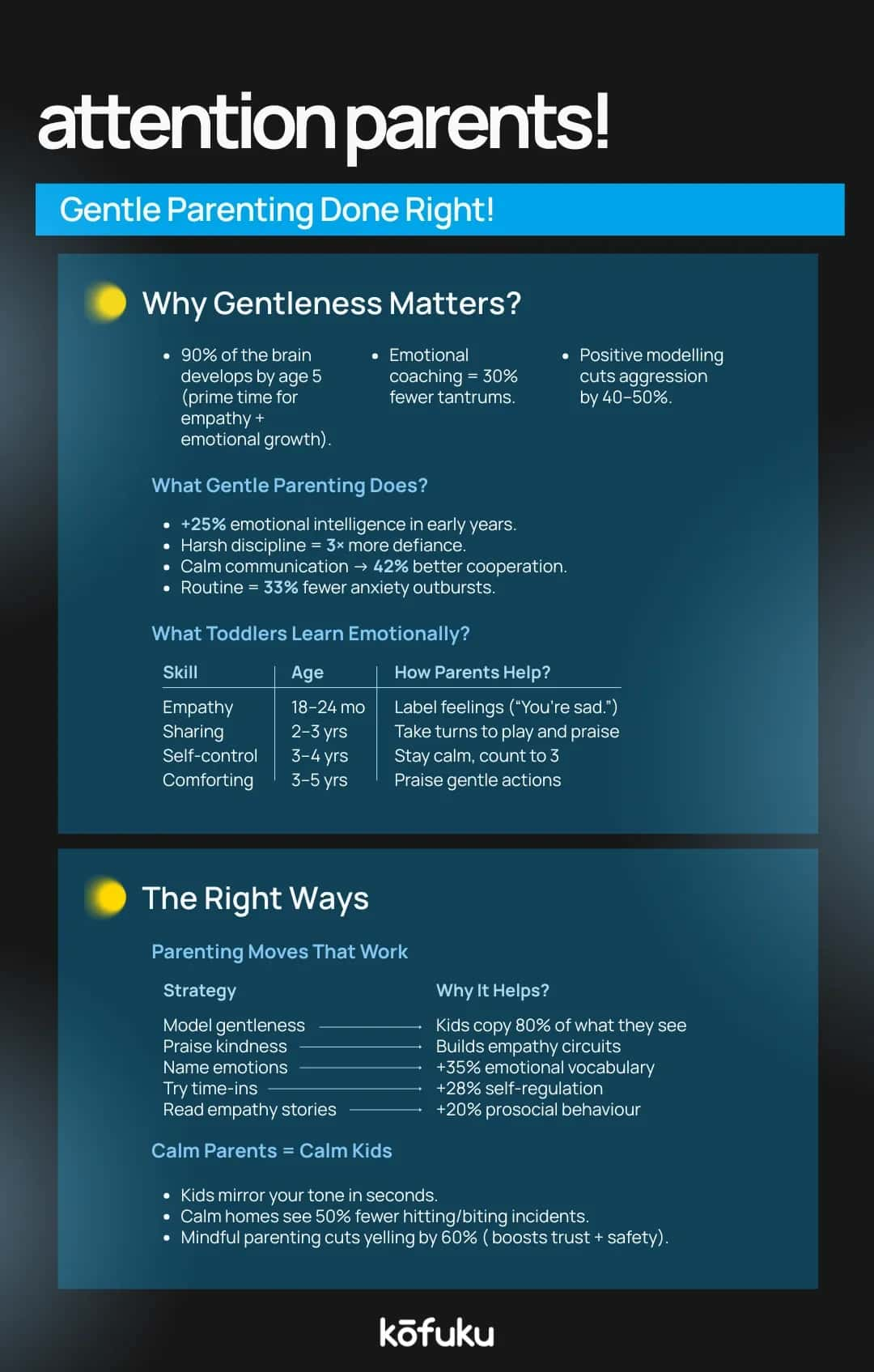Teaching Gentle Behaviour to Toddlers: Effective Parenting Tips

Introduction
Each parent has seen it: mini explosions of rage or something thrown across the room, which is normalised by saying, “She’s just stubborn,” or “That’s normal for toddlers.”
But these are the moments when toddlers begin to develop empathy, patience, and control. Teaching gentle behaviour skills early lays the groundwork for emotional maturity and the ability to form healthy, enriching social connections.
Understanding Toddler Aggression: Causes and Signs
-
Aggressive behaviours of toddlers: Hitting, biting, pushing, or tantrums are not a sign of bad behaviour but a phase of emotional development.
-
Between the ages of 1 and 3, there is rapid growth in physical, cognitive, and emotional development, but they cannot express these emotions.
-
Common causes include frustration, fatigue, hunger, overstimulation, or a need for attention. When toddlers can’t articulate “I’m tired” or “I want that toy,” they may lash out physically.
This is where parenting tips for toddlers become essential, helping children name emotions, recognise consequences, and learn self-control. To prevent escalation, parents need to learn to identify early signs.
These can be screaming, withdrawal or clenched fists. When parents recognise these, they can avert the aggressive acts and help children learn and understand their emotions.
Positive Parenting Techniques to Encourage Gentle Behaviour
Positive parenting techniques stem from empathy, patience, and consistent boundaries. Rather than controlling children and teaching fear-based compliance, these parenting tips for toddlers focus on providing guidance and encouraging cooperation.
-
Model calmness in emotionally charged situations. When parents react to aggression with anger or screaming, and children witness that, they will learn to do the same.
-
Clearly state what is expected of the child. Vague descriptions like “Be good” facilitate understanding of what is expected of them.
-
Encourage gentle behaviour: Affirm gentle behavior like “I love how softly you patted your sister’s back!” to encourage positive behaviour.
-
Provide an outlet: Providing an emotional outlet to your kids is one of the ways to handle toddler aggression. For aggression that comes from excess energy, try running, dancing, or playing with clay.
-
Reinforcement, along with positive-toned communication, is effective with toddlers. Tactile gentleness is perceived as a connection.
How to Handle Toddler Biting and Hitting Calmly and Effectively
Biting and hitting during toddler years, particularly in social situations, is mostly impulsive. Parents should not view these as intentional acts. They should focus on immediate and consistent responses that teach more appropriate impulse control.

Tips on how to respond:
-
Intervene without escalating: Remove the child from the situation in a calm tone, saying, “Biting hurts. We don’t bite!” Raising your voice will only make the situation worse.
-
Address the victim: Comfort the child who was bitten. This will encourage the child to empathise and understand not to bite.
-
Explain: Use simple and direct language. Frame sentence this way - “You wanted the toy, but hitting hurts. Let’s ask for a turn instead.”
-
Teach the intended action: Help them understand that saying “I’m mad!” is a good substitute for hitting.
-
Repetition: Repetition makes responses predictable. This helps the child learn, internalise, and understand the limits you’ve set.
-
Consequences: Steering clear of severe consequences is important, as these can increase anxiety and anger. Focus instead on understanding, relationship, and firm limits.
Building Toddler Social Skills to Promote Gentle Interactions
To prevent aggressive behaviour and promote cooperation, developing toddler social skills is essential. This includes sharing, taking turns, showing empathy, and understanding others’ emotions. Parents can nurture these skills through:
-
Role-playing: Pretend play, like sharing toys or helping a doll “feel better,” teaches empathy.
-
Storytelling: Reading books about kindness or emotions helps toddlers recognise feelings and consequences.
-
Group play: Allow children to interact with peers in supervised settings. Encourage teamwork and praise positive social exchanges.
-
Modelling kindness: Demonstrate gentle tone, patience, and gratitude in daily interactions.

Setting Up a Supportive Environment for Gentle Behaviour
A calm, predictable environment supports gentle behaviour and decreases frustration. Frustration is a common emotional response, and parents can help avoid it in toddlers by implementing small, meaningful changes to promote safety and self-regulation.
-
Establish routines: Consistent schedules help toddlers feel secure and reduce meltdowns caused by uncertainty.
-
Minimise overstimulation: Too much noise or activity can trigger irritability. Quiet corners or soft music can help calm emotions.
-
Encourage independent play: Provide toddlers with opportunities, within limits, to make their own choices to foster autonomy and self-confidence.
-
Be physically available: Children need connection for emotional security and stability, so frequent cuddles, eye contact, and undistracted attention are necessary.
-
Model gentle touch: Show “soft hands” during interactions to reinforce gentle touch, when stroking pets, hugging, or helping another person.
Dealing with Challenges in Toddler Behaviour: When to Seek Help
Occasional tantrums and aggression are normal, but persistent and harmful behaviour may indicate emotional or developmental issues that need professional support. Parents should consider this when:
- Aggressive outbursts occur without provocation or outside a reasonable time frame.
- Children hurt themselves or others.
- There is a significant speech delay that limits their ability to express needs.
- The child has little or no empathy for others.
Paediatricians, child psychologists, and child behavioural therapists will help identify the underlying cause and develop an appropriate intervention plan.
Early appropriate action will help improve emotional development and restore family harmony. Remember, asking for help is not a sign of failure. It is an act of love.

FAQs
Q. How can I effectively handle toddler aggression, like biting and hitting?
A. Stay calm, intervene gently, and state that hitting or biting hurts. Teach alternatives like using words or taking turns. Consistent, calm correction helps toddlers learn emotional control.
Q. What are some positive parenting tips to teach my toddler to be gentle?
A. Model gentle behaviour, use clear phrases like “soft hands,” and praise calm interactions. Redirect energy, validate emotions, and avoid harsh reactions to nurture empathy and patience.
Q. How do I build social skills in my toddler to encourage gentle interactions?
A. Encourage sharing, role-play empathy, and read stories about kindness. Create opportunities for cooperative play and consistently praise gentle actions during peer or family interactions.
Q. When should I seek help for my toddler’s aggressive behaviours?
A. Seek help if aggression is frequent, severe, or affects others’ safety. Consult a paediatrician or child psychologist to rule out developmental, emotional, or communication challenges.
Q. What are the common causes of tantrums and aggressive behaviour in toddlers?
A. Common causes include frustration, fatigue, hunger, overstimulation, or lack of communication skills. Toddlers often express unmet needs through physical actions instead of words.
Q. How can I create a supportive environment to promote gentle behaviour?
A. Maintain consistent routines, offer quiet play spaces, and model kindness. Provide undivided attention, allow choices, and encourage gentle interactions through play and positive reinforcement.
Q. What are some simple ways to teach my toddler kindness and sharing?
A. Use everyday moments, sharing snacks, helping a sibling, or thanking others. Praise kind actions, read empathy-based stories, and role-model generosity in family life.





